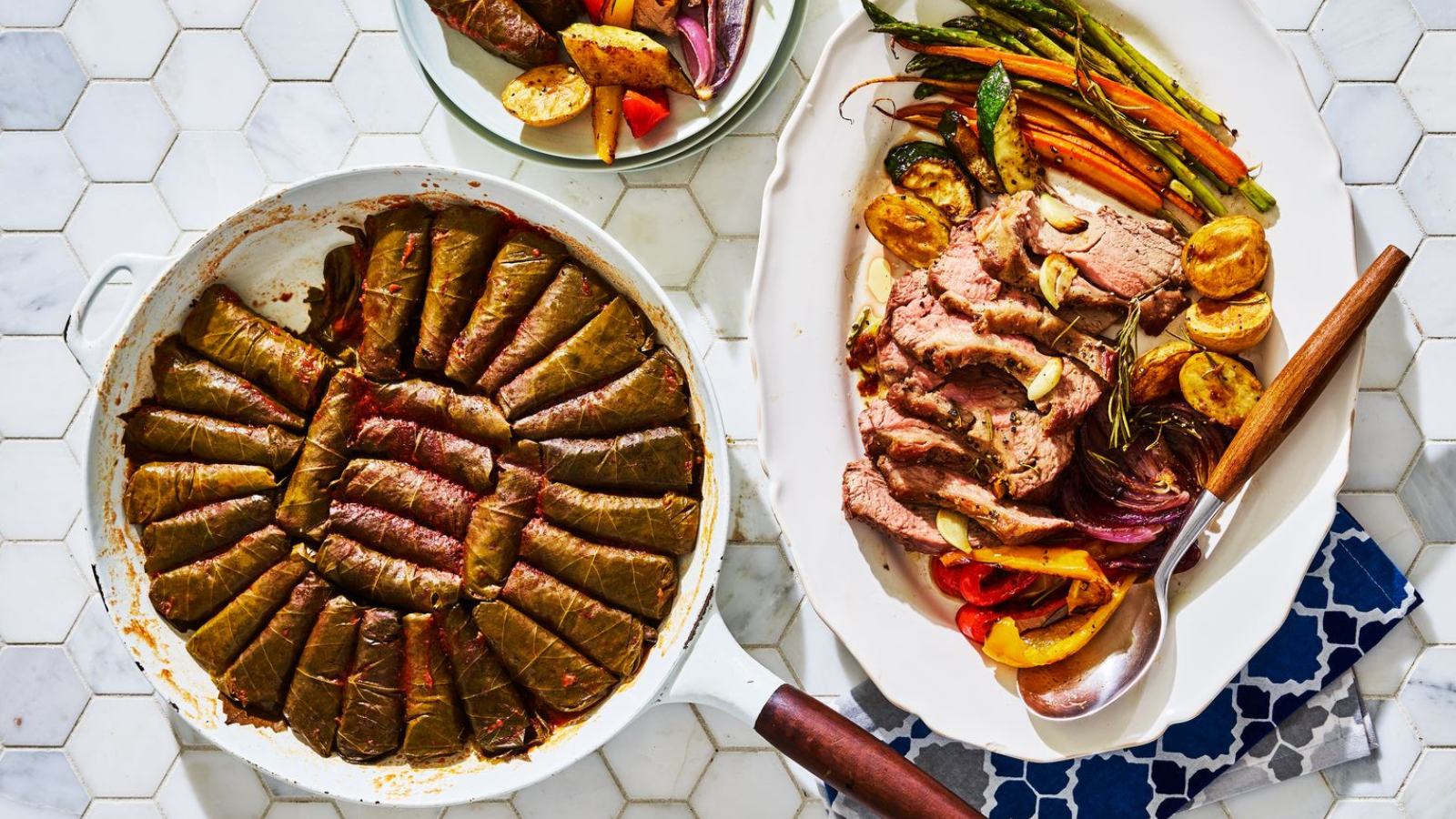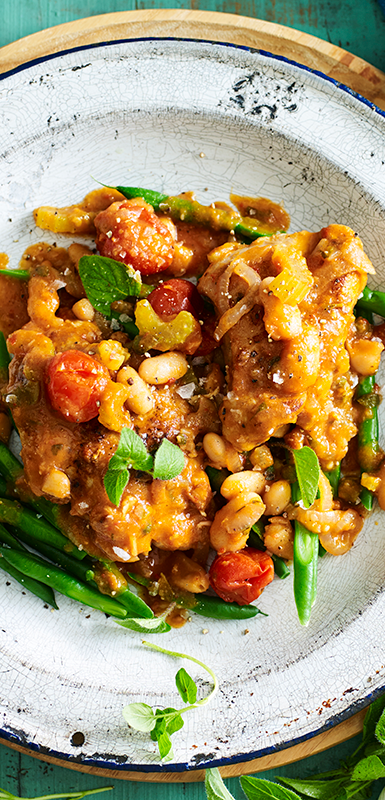What is the Mediterranean diet?


Mediterranean diet overview
Mediterranean cuisine is the food of countries that border the Mediterranean Sea, such as Spain, Greece, France, Italy, and some North African and Middle Eastern nations. Like most cuisines, the dishes of this region have developed over centuries and are based on the foods that grow well in these warm climates – lots of fresh fish and seafood, healthy oils from olives and nuts, plus plenty of plant-based foods such as legumes, wholegrains, fruit and vegetables.
The now world-famous Mediterranean diet acknowledges the health benefits of these traditional eating patterns and lifestyle habits. It was first uncovered in the 1960s by American scientist Dr Ancel Keys in his Seven Countries Study, which found Mediterranean countries had lower levels of heart disease than the United States and Northern Europe. Further investigation determined that this was due to the magic Mediterranean formula of healthy-eating combined with an active lifestyle and a supportive community.
Today the Mediterranean style of eating is one of the world’s most respected and researched eating patterns. Findings from ongoing scientific studies help health professionals regularly adapt and refine the advice available about healthy eating and lifestyles. Leading researchers, such as Dr Catherine Itsiopoulos from La Trobe University in Melbourne, have also conducted studies to find out what happens when people from Mediterranean nations move to countries like Australia. Her research has shown that adopting a Mediterranean lifestyle in a different environment can still provide extraordinary health benefits.
What are the benefits of a Mediterranean diet?
If you think the Mediterranean diet is always in the news, then you’re probably right. It’s hard to keep up with the latest research, as there are countless studies being conducted around the world. The list of positive health benefits also keeps getting longer and stronger, including the diet’s role in the fight against cardiovascular disease, cancer and type 2 diabetes.
More recently scientists have also identified potential benefits for slowing brain ageing and cognitive decline from diseases such as Alzheimer’s and Parkinson’s.
However, the Mediterranean diet has not only been studied for its role in disease prevention and helping you live a longer, healthier life. It’s also being applied to disease treatment, especially for people with existing or high risk of cardiovascular disease.
What's on the Mediterranean diet food list?
Take a look at our Mediterranean recipes using these below ingredients.
- Fruit: Oranges and other citrus fruits, peaches, apricots, apples, pomegranates, berries, grapes, figs, dates and olives.
- Vegetables: Dark green leafy vegetables such as broccoli and spinach, tomatoes (and minimally processed products made from them, such as passata), garlic and onions.
- Legumes: Chickpeas, cannellini beans, red and green lentils, red kidney beans, borlotti beans and split peas.
- Fish & seafood: Oily fish such as sardines, salmon, mackerel, plus calamari, mussels, prawns, scallops and octopus. Canned fish is a good substitute for fresh.
- Lean meat: Lean beef, lamb, poultry or pork.
- Wholegrains: Freekeh (roasted green wheat), barley, oats, buckwheat, millet, polenta, burghul (cracked wheat), brown rice and wholemeal pasta.
- Dairy: Reduced-fat, plain or Greek-style pot-set yoghurt or full-fat for dolloping. Small quantities of strong aged cheese such as parmesan or feta for flavouring soups or pasta, and haloumi or ricotta for adding to salads.
- Nuts & seeds: Pistachios, pine nuts, almonds, walnuts, sesame seeds and pepitas (pumpkin seed kernels).
- Healthy oils: Olive oil remains the staple oil for cooking (choose pure or light olive oil) and dressings (extra virgin is best). Australian-made varieties are often fresher and higher in antioxidant activity.
- Herbs & spices: Basil, flat-leaf parsley, oregano, sage, rosemary, thyme, bay leaves, fennel seeds, mint, cinnamon, cumin, tarragon, saffron and paprika.
Mediterranean inspired recipes
Can a Mediterranean diet help with weight loss?
Despite generous amounts of olive oil, the wholefoods approach of the Mediterranean diet is prized for its weight-loss and weight maintenance benefits. Eating food in its most natural state will help fill you up without adding extra kilojoules that can lead to weight gain.
The days of following a strict low-fat diet to lose weight have also come and gone, and we now recognise the health benefits of good fats such as the monounsaturated fat in olive oil or the polyunsaturated and monounsaturated fats in nuts (saturated and trans fats are still on the outer though).
These healthy fats provide essential fatty acids that our bodies can’t produce on their own, while also aiding the absorption of vitamins, minerals and phytonutrients. Just look at the classic Mediterranean combo of cooked tomatoes and olive oil in sugo (tomato pasta sauce). Studies have shown that lycopene, the potent phytonutrient antioxidant in tomatoes, watermelon, guava and other red-pigmented foods, may protect against prostate and even skin cancer. However, it’s easier for the body to absorb cooked tomatoes rather than raw, and absorption is even better if the tomatoes are cooked in the presence of olive oil.
Mediterranean diet vs modern diets
In stark contrast to the typical highly processed food of modern diets, the Mediterranean diet is rich in natural, seasonal plant foods such as fruit and vegetables, grains, legumes, herbs and nuts. There is plenty of fish and seafood and only small amounts of meat and dairy, plus a golden drizzle of olive oil in cooking and over most dishes. Alcohol is enjoyed in moderation, but always with a meal and always around a shared table.
With this emphasis on whole foods and minimal processing, it tends to be an eating pattern that ticks all current public-health priorities. It’s lower in salt, added sugars, saturated and trans fats and rich in dietary fibre, lean protein and, most importantly, an abundance of phytonutrients.
However, we can’t just look at food as the secret to this success. Even 50 years after migrating to Australia, elderly Italians will still take an evening passeggiata (stroll) around the neighbourhood and maintain daily activity. Or your Greek neighbours might grow olive trees in the front yard or forage for roadside horta (an edible bitter green), maintaining a connection to their food supply. And you only have to attend a Greek wedding or Spanish festival to see the benefits of a strong, supportive community in maintaining mental wellbeing, especially as we age. It’s about adopting the whole lifestyle – not just cooking a tomato-based pasta every now and again.
Can you follow a Mediterranean diet on WeightWatchers?
Absolutely! The Mediterranean diet isn’t a ‘diet’ in the way you might normally think – you’re not meant to stop it once you reach your desired weight, and it’s not just about eating certain foods. To reap the full benefits it needs to become a way of life, supported by physical activity and strong community bonds. Sound familiar? WW encourages and supports these same principles. At WeightWatchers, many Mediterranean foods are ZeroPoint foods including fruits, vegetables, legumes, fish and seafood.



